“We Do Not Want Positive Discrimination But Equality”
Szöveg: László Szűcs | 2009. október 21. 9:34The last survey was conducted five years ago, therefore we do not know exactly how big the ratio of Roma people are in the Hungarian Defence Forces. We were talking about Roma soldiers and young people of Roma origin preparing for a career as contracted or professional troops with Colonel Tibor Jóni, the official in charge of Roma affairs, of the Ministry of Defence.
What are the specific responsibilities of the official in charge of Roma affairs?
It was seven years ago, in 2002, on the basis of government decision No. 1186/2002 that various public administration organizations started to hire Gipsy employees. All this was within the framework of measures promoting the social integration of Romas. The employment of officials in charge of Roma affairs at the Ministry of Defence was also apart of this process. Or more precisely, applications were invited for this position. The two of us, 1st Lieutenant Melitta Horváth and myself won the position and since then we have been working in this field. Of course, there have been some changes in the responsibilities in the meantime, we can say their scope has widened, therefore a Roma Affairs Unit was established, operating in the office of the deputy state secretary responsible for HR. During the reorganization process of 2006 this unit
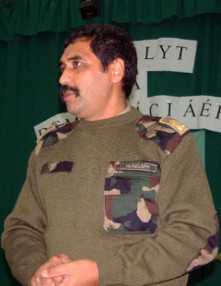
So you used to be a professional soldier?
Yes, I graduated in 1982 from Kossuth Lajos Military College, border guard major. Until 2002 I was working in various positions, in training, or even as the commander of a company. When the Ministry of Defence advertised the job, I changed positions. Of course it also played a great role in this change that between 1994 and 1998 I completed psychology studies at Kossuth Lajos University of Debrecen, while I was still working.
Is my information correct, were you the first in your family to choose the military for a career?
It is. I come from a Szabolcs-Szatmár-Bereg county Roma family, my father worked as a Gipsy musician. For a while I was also flirting with the idea of working as a musician, but I went to the military college after all. Naturally, my brothers also joined the service as enlisted men, but I became the first professional soldier in the family. Fortunately, several relatives have chosen a career as contracted or professional troops since then.
As an official in charge of Roma affairs, what is it exactly that you do?
At the Communication and Recrutiment Department of the Ministry of Defence, as a subordinate of the Scientific Department I plan, organize, and manage the ministry’s Roma affairs-related programs. It is my responsibility to elaborate these programs. I think now there is an even greater need for my work than in the beginning, in 2002. For the social relations we experience today and the ’explosive’ atmosphere, in other words, the appearance of extremist views calls for the employment of specialists who are ’familiar with’ the Roma issue. Since this issue has to be dealt with in the Hungarian Defence Forces as well – just like in society. This is why we have launched various programs promoting equal opportunities. For it cannot be emphasized enough: we, the Roma people serving in the Hungarian Defence Forces do not want positive discrimination but equality!
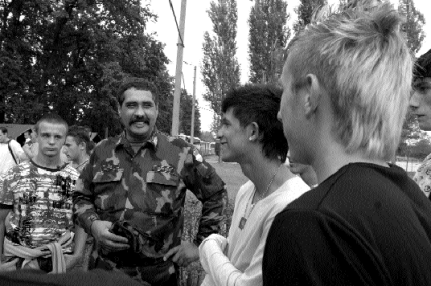
What is the ratio of Romas in the Hungarian Defence Forces today?
It is very difficult to answer this question since the ethnic origin of the troops is not recorded by us in any form in the Hungarian Defence Forces. In spite of that five years ago, in 2004 we carried out a survey and examined the ratio of Roma troops on the basis of a representative sample of a thousand people. There were two results, one relying on the voluntary admission of the answerers, and the other on the experiences of the surveyors. Based on the troops’ own account the ratio of Roma people was between three and four per cent, while the surveyors saw that this value was around seven per cent. This number has obviously increased in the past five years, but we do not have specific data. In my opinion we can clearly say that the ratio of Roma troops is still well below their ratio in society.
You also mentioned that in recent years more and more young Romas have put on the uniform. Is this the result of the equal opportunity programs of the Ministry of Defence?
Definitely. Our recruitment-related programs implemented in the past two years have just produced their results. So fortunately, the number of young Roma people joining the defence forces as contracted soldiers has significantly risen in the last period.
Isn’t integration difficult for them? What is their commanders’ opinion about them?
Unfortunately, it has occurred a few times that they were received with more difficulties than people of non-Roma origin, but it can also be contributed to the prejudices that are present in society. Later, when they ’get over’ these initial difficulties, almost every commander has a good opinion about his subordinates of Roma origin and believes they are good soldiers.
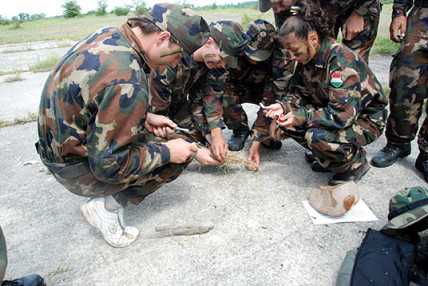
So far we were talking about contracted troops only. But I think there are also some Romas who are preparing for a career in the military as professional soldiers.
More and more, fortunately, and as an official in charge of Roma affairs one of my tasks is exactly this, to work out programs aiming at the above. Among our current programs it is the career orientation camp for young Roma people, held every summer since 2003, which is the most important. This camp promotes the Hungarian Defence Forces among Roma girls and boys between 17 and 21. At the two-week camp the young people wear uniform, fulfil military tasks, moreover, their ’squad commanders’ are Roma non-commissioned officers who are professional troops already. It is not a secret that we intend to win the campers over to a career in the military as professional troops, in other words, to encourage them to apply for Zrínyi Miklós University of National Defence or the NCO school. It was the seventh camp we had this summer this time in Hajdúhadháza and it was a huge success again, just like in the previous years.
Are there other programs promoting the professional troops?
The Lippai Balázs Scholarship, founded by the defence minister in 2003, aimed at Roma people who are full-time students in military institutions, supports the students with some ten thousand forints a month in completing their studies so that they can even become commanders at a later stage.
Let’s return a bit to the career orientation camps for young Romas. How many of the participants apply for a military institution after the camp?
Based on what we have seen so far nearly forty per cent of the participating girls and boys turn up later at the recruitment offices or submit their application to the NCO school or the university of national defence. By the way there are more and more young Gipsies who had been to the camp years ago and since then they have completed some kind of a medium or advanced level training course and now they return to the military with a profession or a diploma in their pocket because they think it gives them the best possibility to plan their lives in the long run.
In addition to the camp, this year’s Equal Opportunities Day, held on the first Sunday of July in Kossuth barracks in Debrecen, also promoted the integration of Roma people. Was the event successful?
We received a lot of positive feedback from the participants, despite the fact that we invited Roma communities only from the Northern Hungarian and the Eastern Hungarian regions. For the young it was a fantastic adventure that they could get inside various technical equipments, combat vehicles. With this whole event our aim also reflected by the minister’s speech was to make Roma people realize: there is a career for them in the military, and there is no discrimination in the barracks as regards one’s ethnic origin, Roma and non-Roma receive equal remuneration for equal work. My personal opinion is that there would be a need for more events like the one in Debrecen.
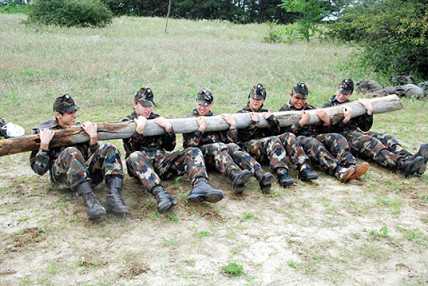
On the Equal Opportunities Day in Debrecen you also had a presentation about the situation and origin of Roma people, the demographic changes and the prejudices against Romas. All the issues that are more emphatically present in today’s Hungarian society. What is it that one must know about this question?
The first and most important thing that must be emphasized is that when we are talking about the Gipsies in Hungary, we do not mean a uniform, homogeneous ethnic group by that. Since the Gipsies constitute at least as complex an ethnic group as, say, the European community. Moreover, each group has its own culture and customs. Scientists still debate a lot about the origin of the Roma people, but written documentation and facts only partly back up the assumptions. Fundamentally, it can be stated on the basis of linguistic research that Gipsies came from India and brought that culture with them. But in addition to the Indian culture the marks of external influences that reached them during their migration can also be detected in the culture of the Gipsies. However, the average citizen knows only very few things about the Gipsies. For example many people do not know the different Gipsy groups in Hungary. Basically the Gipsies in Hungary can be divided in three large groups. The group of Romungros, or Hungarian Gipsies, arrived to the country in the middle ages and they went through a violent assimilation process in the time of Maria Theresia. Consequently, they had forgotten a considerable part of their culture and the Gipsy language. They make up 72-74 per cent of the Roma society in Hungary. What is more, there are several customs in their culture that had been adopted earlier from the Hungarians, from the culture of the peasantry. The next one is the Oláh (Vlach) Gipsy group, 20-22 per cent of Hungarian Gipsies, about whom we must know that they had set off for Hungary at the end of the 19th century, after the liberation of the slaves in Moldva. This is why they did not go through the violent assimilation process but preserved a significant part of their culture and even their use of language. The third large group in Hungary is the group of Beás (Baias) Gipsies, making up 6-8 per cent of the Gipsies. They appeared in the country in larger numbers some time around the end of the 19th century and the beginning of the 20th century and they are the ones who speak the Proto-Romanian language.
Is there a scientific explanation why prejudices against the Gipsy people have evolved?
Psychology says that prejudice is always present in people, for this is what helped humanity find its way among the various things of the world. And there is absolutely no problem with that. The problem begins when on the basis of a prejudice or a piece of information heard somewhere, a group becomes discriminated against. I believe we have got to this stage in Hungary, and negative discrimination against Gipsies has appeared, and what is more, its extreme forms, segregation, physical assault, and physical annihilation have also appeared, the social consequences of which bring forth unforeseeable dangers.
Can anything be done against these?
There is a need for joint action against discrimination, by all means, and communication is very important in this process so that we can understand and get to know each other. Since if we segregate the Gipsies, they will grow up in a separate world, in a subculture, and the values evolving within the group will differ from the values of society. And this is what has happened to them. And in this case we should not accept the Gipsies to adopt the values regarded desirable by us within ’seconds’. Therefore I believe that one has to think consciously, carefully, and in a planned way as regards the integration of Romas.
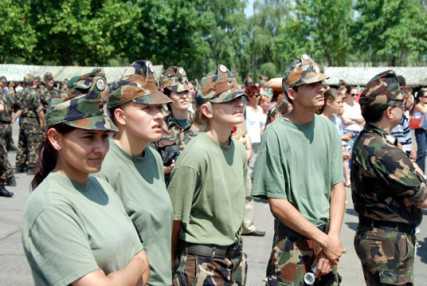
Other ministries also have programs facilitating the integration of Roma people. Are these programs connected on any inter-departmental level?
The Gipsy Inter-Departmental Committee has been operating for years, and every ministry is represented in its work. Fortunately, we have got to a stage where not only the plans but also the actions are in the forefront. For the committee received very positive feedback concerning the programs of the Bajnai government promoting integration, in other words, the winding up of Roma settlements and the employment of graduates in public administration. My personal opinion is that a lot more programs would be necessary to achive equality.
Do you know anything about the programs the Ministry of Defence will launch in 2010 to facilitate the integration of Roma people?
We already know that we will have a smaller budget, therefore we will also have more restricted programs, unfortunately. Nevertheless, we would like to organize the career orientation camp and the Equal Opportunities Day again next year, naturally.